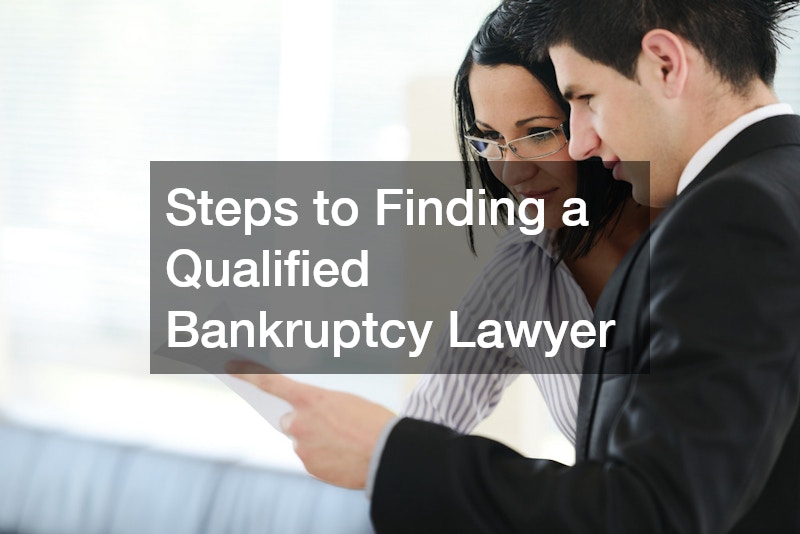
Filing for bankruptcy can be a daunting and complex process. It involves intricate legal proceedings that can significantly impact your financial future. To navigate the complexities, it is crucial to have a qualified bankruptcy lawyer by your side. This article will walk you through the necessary steps to find a competent and experienced bankruptcy lawyer, ensuring that you receive the best possible guidance during this critical time.
Video Source
The first step in finding a qualified bankruptcy lawyer is conducting thorough research. Begin by seeking recommendations from friends, family, or colleagues who have undergone similar financial circumstances. Personal referrals can provide valuable insights into the lawyer’s expertise and approach to handling bankruptcy cases. Additionally, you can utilize online resources, including legal directories and review sites, to gather information about potential lawyers in your area. Make a list of bankruptcy lawyers who come highly recommended or consistently receive positive reviews.
While personal referrals are invaluable, it is important to verify the credentials of any lawyer you consider. Check their qualifications and certifications, ensuring they specialize in bankruptcy law. A lawyer with a well-established practice in this field will have a deeper understanding of the nuances of bankruptcy proceedings. Also, consider the lawyer’s years of experience and their track record with bankruptcy cases similar to yours. This research phase lays the groundwork for choosing a lawyer who can handle your case with expertise.
Another important factor to consider is the lawyer's affiliation with professional organizations. Membership in such organizations, like the National Association of Consumer Bankruptcy Attorneys, indicates a commitment to staying updated on the latest developments in bankruptcy law. It also suggests that the lawyer is dedicated to maintaining high professional standards. These affiliations can give you further confidence in the lawyer’s capability to manage your case effectively. Thus, researching potential candidates thoroughly can separate the truly qualified bankruptcy lawyer from the rest.
Once you have shortlisted potential bankruptcy lawyers, the next step is to evaluate their expertise and experience. A lawyer who has handled numerous bankruptcy cases will be well-versed in the intricacies of the legal process. They should be able to explain the types of bankruptcy for which you might qualify, such as Chapter 7 or Chapter 13, and advise on the best course of action based on your financial situation. Expertise also extends to their ability to predict potential hurdles in the process and formulate strategies to overcome them. This depth of understanding is crucial for successfully navigating bankruptcy.
In assessing experience, consider the lawyer’s familiarity with local court systems and bankruptcy trustees. Local knowledge can impact the progression of your case, offering the lawyer strategic advantages in tailoring your bankruptcy filing. Moreover, experienced lawyers have established relationships with professionals in the bankruptcy realm, which can be beneficial for your case. An understanding of both state and federal bankruptcy laws is essential for any lawyer you choose, ensuring that they can navigate legal variances with agility and precision.
Another aspect to evaluate is the lawyer’s approach to client communication. Consistent updates about case progress and timely responses to inquiries are hallmarks of a qualified bankruptcy lawyer. A lawyer's ability to simplify complex legal jargon into comprehensible advice is key to making well-informed decisions. Their willingness to involve you in each stage of the process empowers you with knowledge and confidence. Therefore, assessing a lawyer’s experience and communication skills is integral to ensuring that your financial future is in competent hands.
After evaluating potential candidates, arranging initial consultations is an instrumental step in the decision-making process. Most bankruptcy lawyers offer free or low-cost initial consultations, allowing you to gauge compatibility without financial commitment. During this meeting, clearly discuss your financial situation and seek the lawyer's opinion on potential legal paths forward. Pay attention to how well the lawyer listens to your concerns and explains their strategy for handling your case. This personal interaction is crucial in determining whether you feel comfortable entrusting them with your financial matters.
During the consultation, inquire about the lawyer's fee structure and the total estimated cost of their legal services. Understanding their charges is vital for budgeting and avoiding unexpected expenses later in the process. Some lawyers may offer installment payment options or provide flat-rate fees, which can be more manageable if you're experiencing financial strain. Comparing these financial aspects across several lawyers can help you make a cost-effective choice. Remember, while cost is an important consideration, the cheapest option may not always be the most qualified.
Lastly, use this meeting to assess the lawyer’s professionalism and dedication. A qualified bankruptcy lawyer should provide a transparent overview of your situation and possible outcomes, clearly outlining their commitment to your case. Take note of their office environment and staff, as a supportive team enhances the client's experience. The insights gained from these initial consultations should guide you in selecting a lawyer who not only fits your budget but also inspires confidence and trust. By being thorough in your selection process, you can find a qualified bankruptcy lawyer who will advocate effectively on your behalf.
.